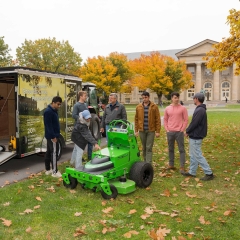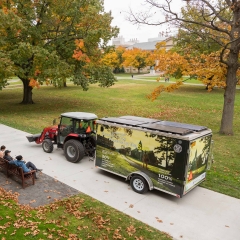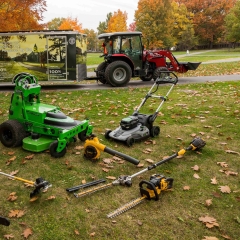Grounds and Landscaping
Sustainability is central to our landscaping and grounds management. A partnership approach between the Grounds Department, Office of the University Architect and Campus Planning, and faculty and students is at the heart of our thriving system of sustainable lands management from campus gardens to low-mow zones and beyond.
Key Partners
Campus Partners
Cornell Grounds Department
- Managing campus landscaping, litter, snow removal, turf, and campus walkways with leading sustainability practices.
Cornell Botanic Gardens
- Responsible for 3,600 acres of natural areas, with a focus on sustainability education demonstration in cultivated gardens, an arboretum, and natural areas.
Cornell Planning Department
- Providing critical leadership by integrating sustainability principles into campus master planning, site use, and more - managing the Green Tree Initiative.
Research Partners
Cornell Small Farms Program
- Helping farmers get expert assistance to facilitate small farm business development, from initial growth to maturity.
Cornell CALS NYS Integrated Pest Management
- Addressing pest management needs for farm, work, school, home, and community through research, demonstrations, education, and outreach.
Cornell Waste Management Institute
- Developing and sharing research-based knowledge to help stakeholders – from farmers to policymakers – make sound decisions on managing organic residuals.
Featured Initiatives and Achievements
Visit the Sustainability Annual Report for more information.
- 79% of campus grounds are maintained using low or no pesticide management, with the intent to approach 100%.
This number is on the rise as the University tests and implements new procedures every season which reduces reliance on traditional chemical management. Both the Grounds Department and Cornell Botanic Gardens implement IPM practices. - 21% of campus grounds are maintained as organic spaces.
The Grounds Dept. follows Integrated Pest Management (IPM) procedures to maintain the campus landscape. To control insects, weeds, and plant diseases that threaten lawn, flower, shrub, and tree species, IPM uses a holistic approach that includes many cultural pest control techniques including naturalized landscape design, emphasizing the diversity of species, use of hearty, disease and pest-resistant varieties, and mulching, reducing harmful chemical pesticide use wherever possible. Prioritizing soil remediation to improve land health during and after construction.
Construction projects can disrupt soil and land health. Cornell focuses on long term soil remediation after construction. It is possible to not only reduce harm, but improve the chemical, biological, and physical properties of soils, thus allowing for improved plant growth. Campus partners have been implementing soil remediation since 2003. Examples include structural soil and turf on Tower Road and the Green Roof on Fernow.
Featured Project:
Solar Landscaping Trailer
This year Cornell University Sustainable Design: CUSD partnered with the Grounds Department in Facilities to design and build a mobile solar trailer — moving our landscaping and groundskeeping closer to carbon neutrality.
The trailer harnesses all the solar power needed to use an electric mower, leaf-blowers, and hedge trimmers. It produces 1,151.2 kWh of energy over the course of a year - enough energy to power a normal 60-watt lightbulb for 2.2 years. By using renewable energy, the Grounds Department is able to save approximately 33 gallons of gasoline or diesel and 660 lbs of greenhouse gas emissions.
With a functional trainer to test electrical grounds equipment, the Grounds crew can scale up future purchases as new electrical landscaping equipment becomes available on the market.




